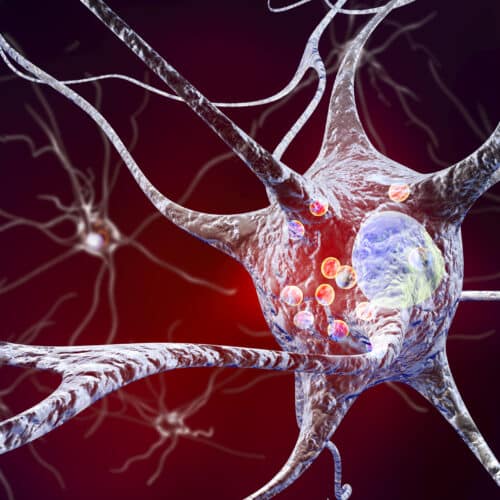Parkinson’s and alpha-synuclein

Alpha-synuclein is protein present in everybody. However, in Parkinson’s, alpha-synuclein is known to clump, or aggregate, in nerve cells (neurons), likely contributing to the cell loss seen in Parkinson’s.
What is alpha-synuclein?
Alpha-synuclein is a protein predominantly found in our brains, making up around 1% of all the proteins found in neurons (the main cell type in the brain). Proteins play an essential role in many aspects of our cell’s ability to function. All proteins are made up of long chains of molecules (called amino acids), which must be folded in a specific way in order to carry out their intended jobs.
In healthy neurons, normal alpha-synuclein is typically found just inside the surface of the neuron membrane as well as in the tips of the branches extending out from the neurons – in structures called presynaptic terminals, which are critical to passing the chemical messages between each neuron.
Why is alpha-synuclein relevant to Parkinson’s?
Alpha-synuclein is associated with Parkinson’s both at the protein and genetic level.
Protein
In the neurons of many people with Parkinson’s, alpha-synuclein has been found to be misfolded. These incorrectly constructed versions of alpha-synuclein build-up and clump together in aggregates called ‘Lewy bodies’. Lewy bodies obstruct other parts of the cell, leading to dysfunction and eventually cell death if not cleared. We don’t know what exactly causes this, but there is evidence that misfolded alpha-synuclein can be passed between neurons. Once inside, the alpha-synuclein ‘seeds’ the formation of new Lewy bodies inside the next neuron. This is one of the ways researchers believe Parkinson’s progresses and spreads from cell to cell.
Additionally, when we look at the brains of people with Parkinson’s, we see that Lewy bodies are present in areas that have suffered neuron loss. This is especially prevalent in the region of the brain containing dopamine-producing neurons. Dopamine is a neurotransmitter – signalling molecules used by neurons to communicate with one another – which helps control feelings of pleasure, satisfaction and motivation, as well as movement, sleep, concentration, and other body functions. It is the loss of these dopamine-producing neurons that causes Parkinson’s to progress.
Genetics
There is also a genetic association between alpha-synuclein and Parkinson’s. Approximately 10-20% of people with Parkinson’s have genetic variations that infer a higher risk of developing the condition, with mutations in the gene associated with alpha-synuclein accounting for a small proportion of these. The SNCA gene provides cells with the instructions for building alpha-synuclein; therefore, small changes in this gene can potentially interfere with the cell’s ability to construct alpha-synuclein and may contribute to Parkinson’s development.
Can we stop alpha-synuclein clumping, and Lewy bodies from developing and spreading?
Researchers around the world are currently investigating this. Some are looking at developing vaccines that target alpha-synuclein to stop the protein being passed between cells in the hope that it stops or slows down Parkinson’s progression.
Other areas of research are focused on medicines that could stop the formation of or help cells breakdown alpha-synuclein clumps. Cure Parkinson’s are involved with the medicine ambroxol, which has been shown to improve the waste clearance in cells, including excess alpha-synuclein.

Parkinson’s and dementia: improving cognitive measures to enable better treatments
Recently, several international Parkinson’s and Dementia with Lewy Bodies (DLB) advocacy organizations, including Cure Parkinson’s, held a roundtable to discuss the development of better tools for measuring cognitive changes…

Alpha-synuclein or Tau in Parkinson’s?
The build-up of a protein called alpha-synuclein has been considered one of the hallmarks of Parkinson’s. Recently, however, a group of scientists have called into question the ‘bad guy’…

A review of our 2023 preclinical projects
In 2023, Cure Parkinson’s has funded five new preclinical projects. These preclinical projects address a wide range of ‘targets’ to understand which drugs and which targets should be further…

Our first pipeline project of research
Our first project from our Research Pipeline Acceleration Programme is now underway. Professor Michael Schwarzchild is investigating evidence needed to determine if three iLCT-evaluated compounds are ready to progress…

A biomarker for Parkinson’s?
New research from an international consortium led by the Michael J Fox Foundation has highlighted a potential biological biomarker for Parkinson’s.

Webinar: Clinical trials targeting alpha-synuclein
The latest instalment of this quarterly webinar series discussed clinical trials targeting alpha-synuclein, with Edinburgh University’s Professor Tilo Kunath as chair.

Phase 1a trial findings of iLCT prioritised drug, Anle138b
The findings of the phase 1a clinical trial of Anle138b have been published. Anle138b is a new drug that targets the build-up of alpha synuclein, a protein that clumps…

The lonafarnib pre-clinical study
This research led by Professor Joe Mazzulli, will, it is hoped, give us a better understanding of how lonafarnib can reduce the build-up of the toxic protein alpha-synuclein which…

Tackling toxic alpha-synuclein
Three major lines of clinical investigation are currently underway to determine if stopping the clustering of alpha-synuclein in Parkinson’s can help to slow down the progression of the disease.

The Anle138b Trial
This clinical trial is testing a small molecule called Anle138b to assess its potential to inhibit alpha-synuclein masses accumulating. In Parkinson’s, alpha-synuclein, which is abundant in nerve cells, begins clumping together (or aggregating) and…
